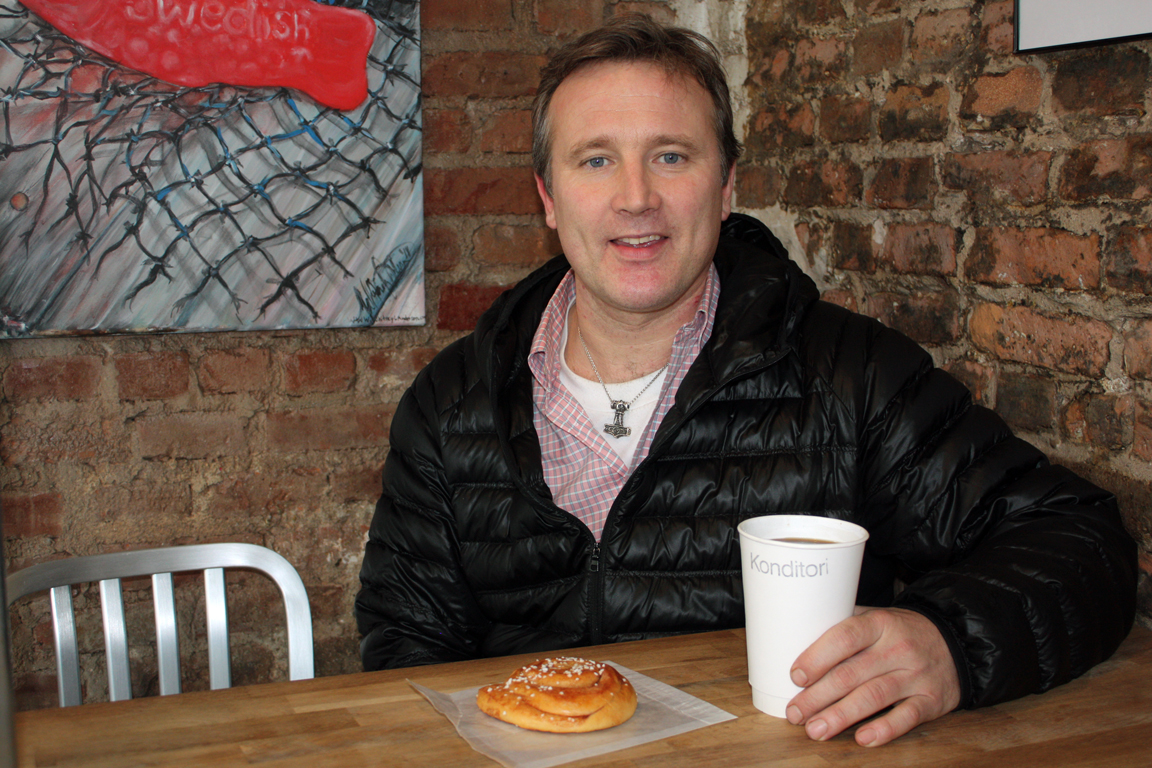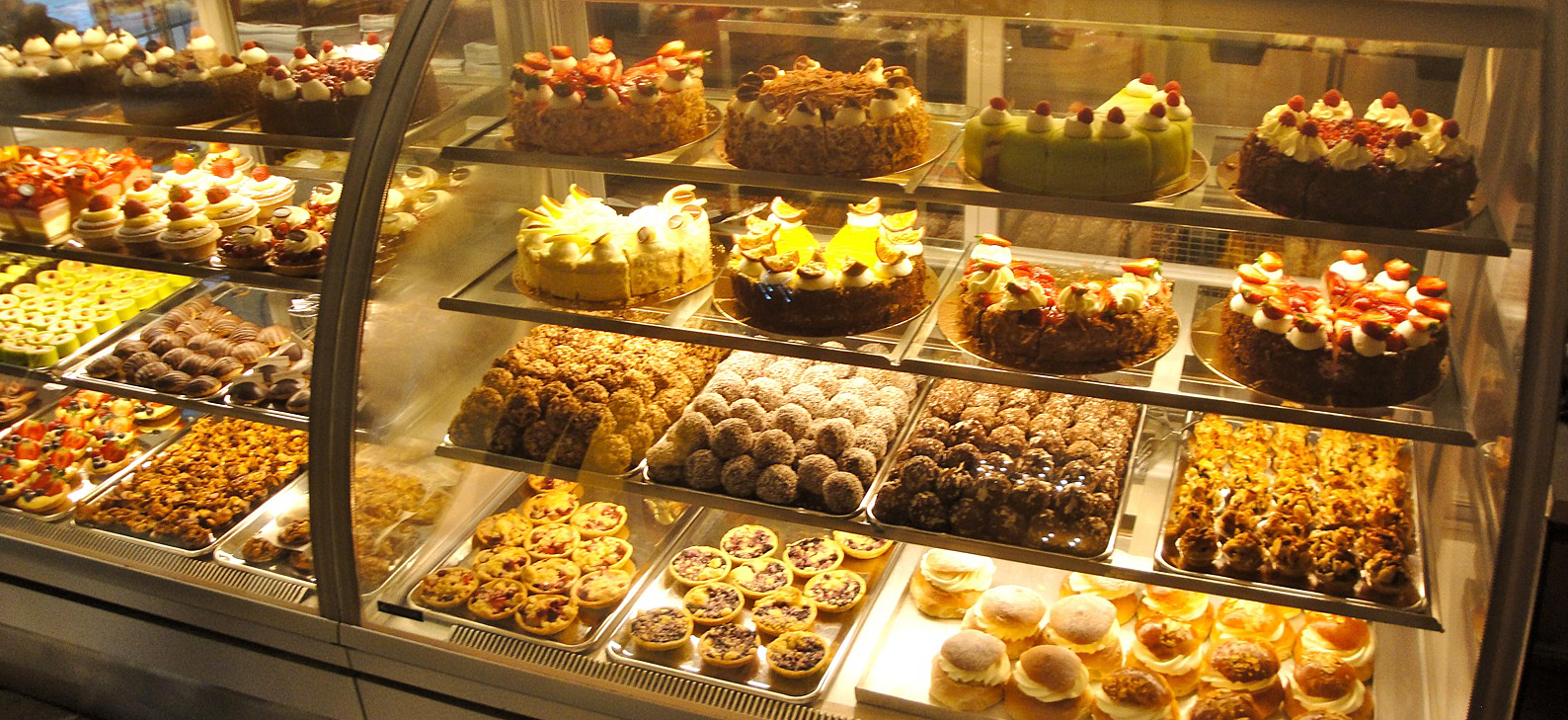Coffee at Konditori
A visit to Konditori, a Swedish coffee shop on Manhattan's Lower East Side.
-
 Per Inglander, co-owner of Konditori, sits down for his umpteenth coffee of the day and a "kanelbulle."
Per Inglander, co-owner of Konditori, sits down for his umpteenth coffee of the day and a "kanelbulle." -
-
The Swedish word “konditori”—“kondis” for short—conjures up old-fashioned places where one used to take coffee and a piece of “kaffebröd” (sweet, baked goods) way before the onslaught of cafés. A konditori was usually a sedate place for the older age brackets, cozy was never a word used to describe it, and the coffee came in regular-sized coffee cups, with a paper triangle of coffee cream (“kaffegrädde”) and a few sugar cubes on the side, served by a waitress in a black skirt and a prim white blouse. The syrupy, frothy concoctions we enjoy today were unheard of then. With this in mind, it should come as no surprise that Konditori, the name of a string of Swedish coffee shops in Manhattan and Brooklyn, offers a similarly toned down setting, albeit in a 21st century edition. It is mostly a stop-and-go place; at least the Manhattan branch is too small to lounge in. Coffee is king here, even though Swedish co-owner Per Inglander’s mission is to teach Americans to “dunk the cinnamon buns or the cardamom bread in the coffee.” Inglander, who for many years worked in the clothing business, got the idea for a coffee place in New York 14 years ago for obvious reasons.
“I love coffee and couldn’t find any in the city that tasted good.”
Most Swedes have a penchant for strong coffee, and coffee is one of the first things we encounter in the U.S. that baffles us: Weak, lukewarm and drunk in buckets, it is not the coffee we grew up with. Inglander is more than a coffee lover however, although cordial and nice, his foot taps incessantly—the mark of a true caffeine addict. -
 Not from the Brooklyn and Manhattan based Konditori but a generic photo from a typical Swedish "Konditori" or "Kondis"
Not from the Brooklyn and Manhattan based Konditori but a generic photo from a typical Swedish "Konditori" or "Kondis" -
-
It's all about beans ... and pressing
“It’s important to have good baristas, great customer service and great bagels and muffins,” he tells me. “And with bagels and muffins, I include cinnamon buns and cardamom breads, everything. But the most important of our four cornerstones is coffee. We use three different kinds of beans.”
Coffee beans, Inglander explains as we squeeze into the rectangular, closet-sized space that is Konditori on Manhattan’s Lower East Side, exist in more varieties than wine grapes, and the beans Konditori uses come from Peru, El Salvador and Ethiopia. But just as important as the beans, is the process.
“We fresh press our coffee, which is unusual here. It means more work, but otherwise the beans, and the taste, get stuck in the filter. Coffee mixes with water for an average of 20 seconds in most American cafés, we fresh press it and it mixes for 40 minutes.”
By “we,” Inglander means himself and co-owner, Ronny Kaj, a Brooklyn-born businessman who comes from a family of bagel-makers. The two met when they were both in the clothing business.
At Konditori, the “kaffebröd” is placed in glass containers on the counter where they are to tempt the customer who is rushing in for a cup to go. It is baked, using recipes from Inglander’s mother, by a Swedish baker in Park Slope. I look over the selection: The cinnamon buns (kanelbullar), properly done the Swedish way with “pärlsocker” rather than frosting, look good but I choose a coco ball (“chokladboll”)—that sweet mix of cocoa, butter, oats and coconut flakes.
“Those I make myself,” Inglander smiles. “We sell at least 150 a week, and I can only do 18 at a time—you do the math.”
They are good, though, very good. They do what sweets are supposed to do: make me happy. I tell Inglander that. He quickly gets up to hand me a slice of his cardamom bread with almond paste filling (“mandelmassa”). I dunk it, as suggested, and it too is good, but not as good as the coconut ball. Inglander tells me it’s his own recipe and that it is their number one bestseller.
“We tried saffron bread for Christmas,” he also reveals. “It went so-so.”
Inglander says he likes clothes but loves coffee, and therefore the work he now has to put into the Konditori endeavor is worth it, including rolling 150 sticky coconut balls a week. I want to know how much coffee he drinks. He says three to four cappuccinos a day and a couple of coffees. The tapping foot tells me it’s more than that.
As I leave, I ask the barista, a charming guy who came to New York from Colorado only two months ago, what he thinks of the Swedish things he sells.
“I like the coffee, I like the cinnamon buns,” he answers dutifully. “But the coco balls, I just can’t take them. Something about the coconut flakes.…”
And what do I think of coffee? I don’t know. I wonder about it as I head out in the cold New York streets. Have I been here so long I can no longer tell the difference between coffee and coffee? It is far better than your regular run-of-the mill deli coffee served in Styrofoam cups, but is it that good? I can’t decide. The coco balls however, they melt in my mouth. Totally worth the $2.75 price tag.
The first Konditori opened in 2010. There are currently three Konditori coffee shops in Brooklyn—two in Park Slope and one in Williamsburg. There’s one Konditori in Manhattan, the one Nordstjernan visited, on the Lower East Side.
By Eva Stenskär -
For more info, see www.konditorinyc.com
-
-
